What is Decentering Men? Why is it important?
Most of us have grown up in a patriarchal society that has always considered men as the standard, whether it’s in building cars or setting office temperatures.
Women have, from birth, been expected to live for their hypothetical husband. Our mothers and grandmothers’ lives probably revolved around the convenience of men (mostly husbands and fathers) in their lives.
Decentering men involves prioritizing yourself as a person and your needs, while removing men from a central position in your life.
The men you decenter may or may not be narcissists, but many of them grew up entitled. Often, men have difficulty understanding women’s lived experiences, especially when they haven’t taken the time to listen or learn from women.
How many of them actually care about women and their issues?
The world now talks about men’s loneliness and mental health. We have hidden our traumas, mostly caused by men, for a very long time and pretended we are fine.
They actually mock us for our traumas caused by men and give it a fun name: ‘daddy issues.’ So why should we bother about theirs?
Reflect for a moment: How many times have you felt let down by men who were supposed to support or guide you?
How often have men in your life played a controlling rather than supportive role?
The truth is, setting boundaries with men until they can empathize and actively work on themselves can be a critical step in self-protection and growth.
So stop including them in your life until they work on themselves or make a bare minimum effort to understand our problems.
Decentering men is like Boundary Setting 101, which is a crucial aspect of healing from narcissistic abuse. You will be saved from many narcissistic men and their manipulations.
Many societal standards and norms are established for the convenience of men. Thus, by decentering men, you’re prioritizing yourself first.
Decentering men is a way to realize that certain things you thought you enjoyed, loved, or believed in were essentially what society indirectly told you was cool—again, keeping up with what men found cool.
If you’ve ever felt pressure to be the “cool girl” (as explored in Gone Girl), you’ll understand the value of breaking free from behaviors and beliefs molded by the need to please.
True empowerment lies in taking actions grounded in your values and priorities. In this article, we’ll walk through 10 strategies to help you decenter men and reclaim your power—step by step.
Here are 10 Strategies for Decentering Men:
1. Avoid Following Men Online (Until They’ve Earned Your Trust)
Let’s face it: not every man online has women’s best interests at heart—including influencers, celebrities, coworkers, and even acquaintances.
It’s always better to assume that most of them are either ignorant about women’s issues or are sexist. Many of them are really insecure, thanks to patriarchy.
Many men online are either unaware of or, unfortunately, dismissive about issues affecting women.
They might be supportive on the surface, but internalized biases, often reinforced by patriarchal conditioning, can still shape their content.
If you follow men, make sure they’ve earned your trust by consistently showing respect for women and advocating for gender equality.
Report content that openly promotes sexism and misogyny.
To protect your mental space and get the support you need, try seeking female influencers and creators instead. Make an extra effort to discover the best female content creators and influencers.
Whether you’re interested in fitness, professional growth, or personal development, following women online can offer deeper insights, as they’re more likely to understand and address challenges women face daily.
Plus, these women are often putting themselves out there despite facing online harassment, trolling, and even threats, making their contributions all the more valuable.
Pro Tip: Bookmark resources or compile a list of female content creators to explore and follow. These resources can become your go-to for online learning and entertainment in a way that aligns with your values.
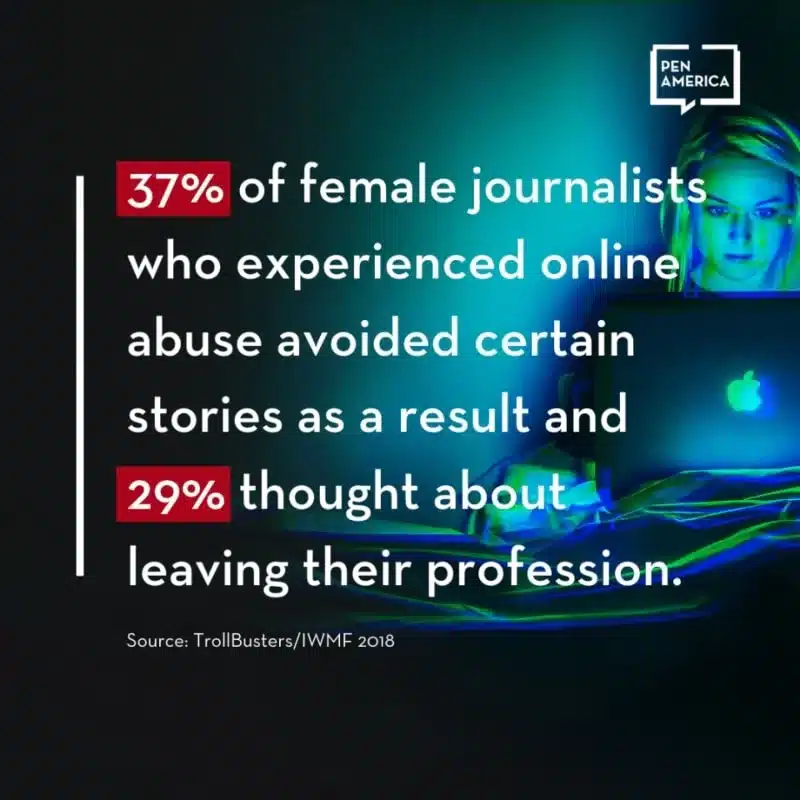
The infographic above from Pen America gives insights about online abuse. You can read the full article here.
Take the extra step to celebrate and uplift female friends and creators on your social media. Share their content, engage positively, and cheer them on.
This can be as simple as supporting a friend’s small business or reposting a female creator’s insightful content. By doing so, you not only help amplify their voices but also create a network of encouragement and solidarity.
Celebrate your female friends. Embrace sisterhood and uplift each other online.
Remember, supporting women online is one way to actively build a network of support that patriarchy often discourages.
2. Being Selective About Which Men Have Access to You
Be very selective about the people you give access to in your life, both online and offline.
If possible, keep your social media accounts private. Keeping your online space safe and supportive is key, and that often means being selective about who gets to follow you on social media.
As a step toward decentering men, consider making your accounts private or limiting your followers to those you trust. Don’t feel obligated to give men access to your online life—especially if they haven’t proven they respect your boundaries and independence.
In some cases, men might follow you with ulterior motives, ranging from jealousy to romantic interests disguised as friendship.
This isn’t about assuming the worst but about maintaining control over who enters your personal digital space.
Many men, even unintentionally, struggle to fully celebrate women’s achievements and independence, sometimes responding with competition or even resentment.
To avoid the unnecessary stress of navigating these dynamics, allow only those who genuinely support and uplift you to follow your accounts.
The following infographic from Pew Research Center focuses on online harassment via online dating sites and apps in America.
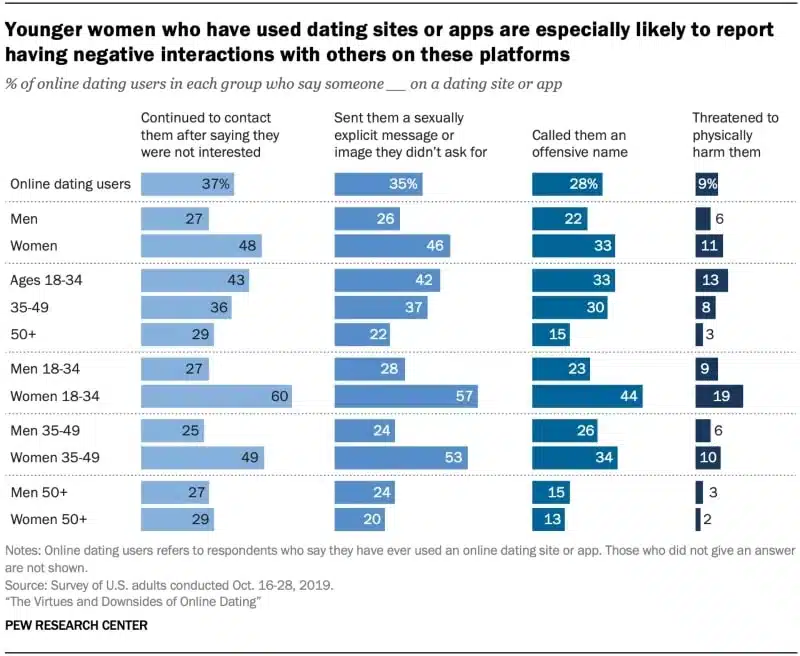
Another way to safeguard your mental and emotional energy online is to avoid giving men the benefit of the doubt if their intentions seem unclear.
Trust your instincts and prioritize your comfort over being “polite” or “open-minded.” This approach helps build a more empowering online experience and a strong boundary against anyone who may want to be in your life on their terms, not yours.
Pro Tip: To maintain a supportive online circle, routinely review your follower list and remove anyone who isn’t bringing positivity or mutual respect into your digital space.
Transitioning to a more private and selective online presence is a simple but impactful way to reinforce your boundaries and further decenter men from your social interactions.
3. Supporting Female-Owned Businesses and Services: A Step Toward Decentering Men
One powerful way for decentering men is by actively supporting women-owned businesses and services.
Choosing to shop from women-led stores, local artisans, and independent creators directly supports the advancement of women in various fields.
Many of these businesses operate on tight budgets and rely heavily on word-of-mouth rather than large marketing campaigns, so every bit of support goes a long way.
A Boston Consulting Group study shows that women entrepreneurs who receive funding tend to generate more revenue per dollar invested compared to their male counterparts, producing over twice the revenue per dollar.
But (PitchBook report) female founders received only 2% of total VC capital in 2022 in the US.
The following infographic from BCG shows review of five years of investment and revenue data.
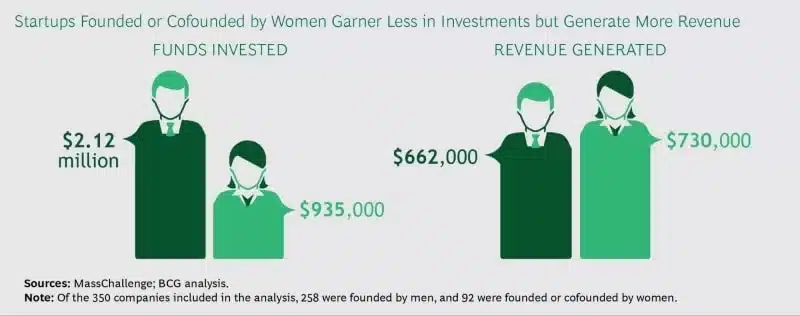
According to Certified Sustainable, businesses led by women are more likely to be eco-friendly.
Additionally, consider prioritizing female professionals when hiring for services you need, whether it’s a doctor, accountant, lawyer, or even house help.
By consciously choosing female experts, you’re supporting women who have overcome significant societal hurdles to establish their careers, often in male-dominated industries.
Supporting female professionals not only helps women achieve economic independence but also expands your network of strong women who can provide expertise from a unique and often underrepresented perspective.
Every time you hire, consult with, or purchase from a female-owned business, you’re participating in a cycle of encouragement and growth for women in your community.
Pro Tip: Check out local directories or online platforms dedicated to women-owned businesses to discover and support female entrepreneurs in your area.
This step in decentering men from your everyday life shifts your focus toward a community that values women’s resilience and achievements.
In doing so, you’re fostering a supportive environment that benefits not only you but countless other women as well.
4. Supporting Female Art and Artists
One impactful way of decentering men from your worldview is by supporting female artists and creators.
For centuries, the art world and entertainment industry have been largely shaped by male perspectives, leading to a pop culture landscape that often leans sexist or one-dimensional in its portrayal of women.
This is why we rarely see narratives truly crafted from women’s viewpoints.
The following infographic is from a Nature article.
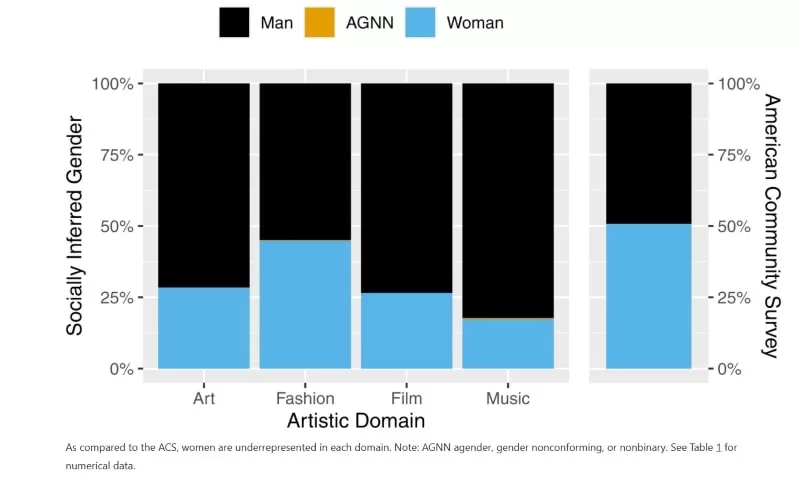
According to the above mentioned Nature article, while women make up 51% of the U.S. population, they are underrepresented in contemporary art (28%), fashion (45%), box office film (27%), and popular music (17%).
Growing up with women’s stories filtered through male creators has had a powerful impact on how we see ourselves, leading many to embody the “cool girl” trope – women molded to cater to male fantasies.
But by actively seeking and celebrating female perspectives in art, literature, film, and music, we begin to break this cycle, opening up space for narratives that resonate with women’s real, complex experiences.
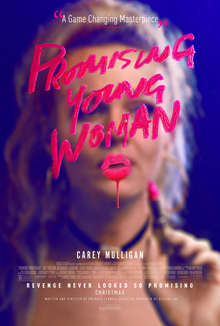


Whether it’s attending a gallery featuring women’s artwork, watching films directed by women, reading books by female authors, or following female content creators, these choices add visibility to women’s perspectives.
It’s a conscious choice that supports women in industries where they’re often sidelined while also enriching our own understanding of women’s experiences.
Pro Tip: Check out independent female-led galleries, feminist bookstores, and streaming platforms that highlight female directors and creators to easily access diverse female perspectives.
Transitioning your support toward female artists and creators not only disrupts male-centered norms in art and media but also fosters a culture that values and encourages genuine female narratives.
In decentering men, you’re helping to build a creative world that reflects the richness of women’s lives and stories.
5. Supporting Women-Focused Charities: Decentering Men Through Compassion and Action
Another way of decentering men and uplifting other women is by supporting charities and organizations that focus on helping women, especially those who are victims of abuse or hardship.
By directing your time, resources, or donations toward women-centric charities, you’re actively contributing to a more equitable world and helping women access the resources they need to heal and thrive.
This support isn’t only about charity—it’s a reminder of shared resilience, compassion, and the idea that any of us could have found ourselves in a similar position.
Many women’s shelters and support organizations face significant challenges due to limited funding and reliance on community support.
The following infographic from 2MODA shows things your local women’s shelter desperately needs.
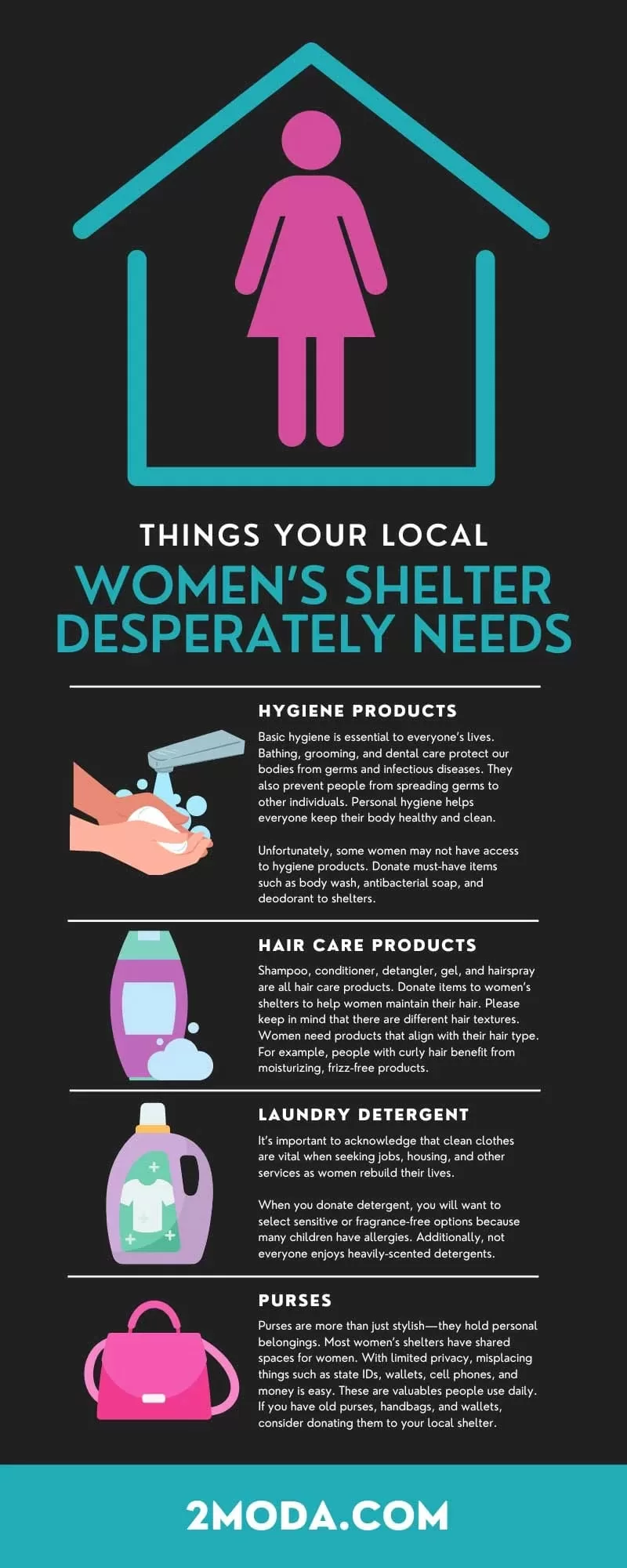
Here is a list of non-profits working to empower women:
https://goodgrants.com/resources/articles/10-nonprofits-working-to-empower-women-across-the-globe/
From domestic violence shelters to career training programs for single mothers, these organizations tackle issues that uniquely affect women.
They provide a safe haven and the tools for women to regain control over their lives and build futures they deserve.
Supporting these efforts not only empowers individual women but contributes to a global movement of resilience and strength.

To make a difference, consider setting up recurring donations, volunteering your time, or even amplifying the work of these charities on your own social media to spread awareness.
When we support women-focused organizations, we’re reminding ourselves of the power of solidarity and the importance of standing together, no matter our personal circumstances.
Transitioning from individual empowerment to collective support helps build a network of safety and encouragement for women everywhere.
By choosing to back these causes, you’re contributing to a world where women can rise, rebuild, and thrive—free from patriarchal limitations.
6. Unfollowing and Withdrawing Support from Misogynistic People and Organizations
Money talks. Every time you choose where to spend your time, money, and attention, you’re casting a vote for the kind of world you want to live in.
If a person or organization expresses sexist or misogynistic views, it’s well within your right—and a form of decentering men—to withdraw your support. This action sends a message that disrespectful or harmful views toward women won’t be tolerated.
Here are a few examples of companies that shut down or faced public backlash.
AIB, an Indian company, shut down primarily due to two separate instances where complaints of sexual misconduct by employees against collaborators were not addressed. This happened despite the company profiting from its stance against misogyny and other social issues.

Recently, Bumble—a dating app founded by a woman and promoted as putting women first—released a controversial ad poking fun at celibacy and abstinence, which led to public backlash.

Action Step: Start by unfollowing people on social media who promote or support sexist ideals. Seek out organizations that actively empower and respect women’s rights and show your support there instead.
Your actions may feel small, but collectively, these choices add up and can help drive a positive shift in society.
Ultimately, withdrawing support from those who lack respect for women is not about punishment; it’s about aligning yourself with values that support personal growth, integrity, and fairness. It’s a powerful step in creating the world you want to see.
7. Voting for Women Leaders and Allies: Empowering Change Through Politics
Politics is one of the most powerful areas where we can advocate for change. By supporting women leaders and allies who genuinely support women’s rights, we’re casting votes for a future rooted in equality and respect.
Every vote for a woman or an ally can shift power toward policies that support women’s rights, fight gender discrimination, and uphold freedoms that directly impact women’s lives.
The following infographic from Whatwillittake explains the political divide.
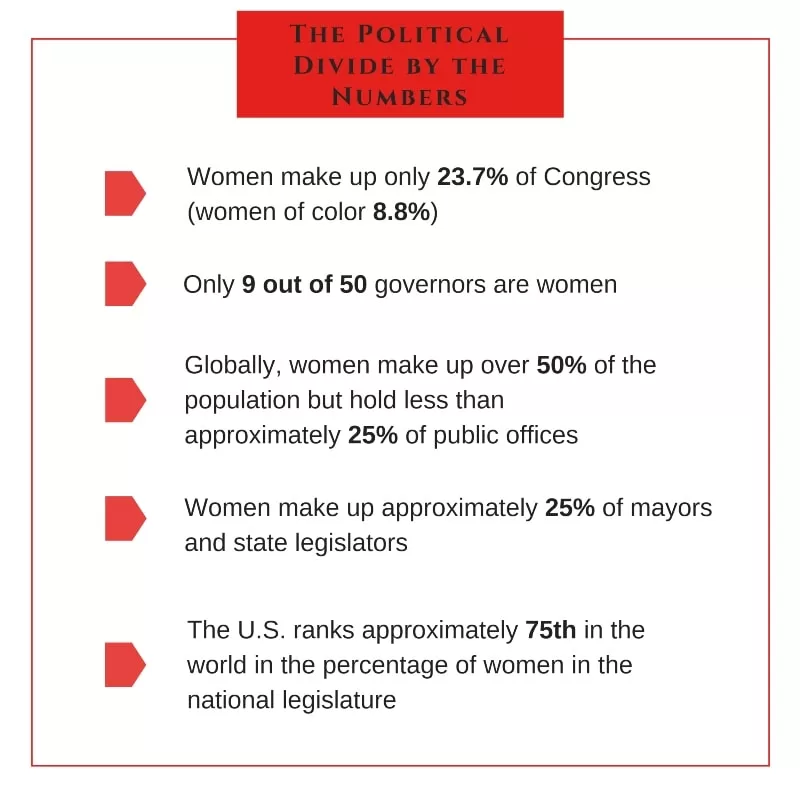
The following infographic from Pew Research Center explains public views of obstacles faced by women in politics.
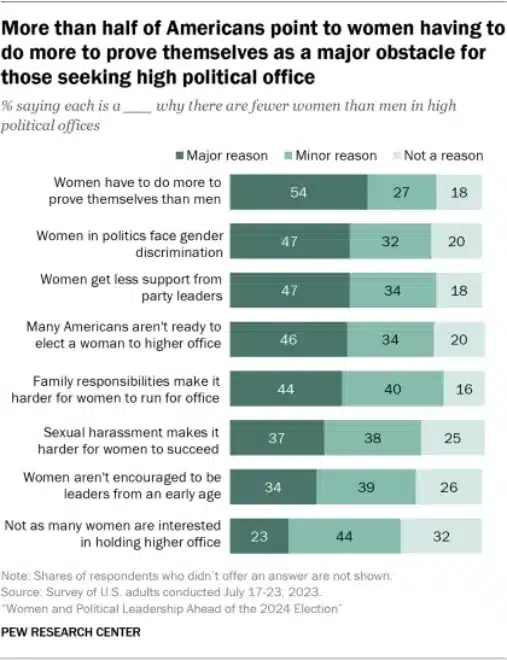
When evaluating candidates, look beyond their promises and dive into their backgrounds, policies, and track records.
Some candidates openly campaign against women’s rights and would roll back progress if given the chance.
Understanding their true positions allows us to support those who are sincerely committed to creating a more inclusive society.
Action Step: Make your vote count by researching candidates in your area. Seek out female candidates or strong allies of women’s rights who align with your values. Your support can encourage more women to step into leadership, knowing they have community backing.
Voting with purpose is a powerful form of decentering harmful influences in our lives and society at large. By supporting leaders who prioritize women’s issues, we’re actively creating a more balanced, fair society for everyone.
8. Redirecting Support from Traditional Religious Institutions: Choosing Empowerment Over Tradition
While everyone’s beliefs are personal, it’s no secret that many mainstream religions have historically upheld systems of misogyny and patriarchal control, often relegating women to secondary roles.
Decentering men can also mean re-evaluating the structures we choose to support with our time, money, or energy—especially if those structures do not view or treat women as equals.
Did you know that women are turning away from traditional religions in higher numbers than men? Read the article below for more insights.
https://www.studysmarter.co.uk/explanations/social-studies/beliefs-in-society/gender-and-religion/
Consider Alternative Practices: Rather than offering financial support or dedicating time to institutions that do not value women equally, explore spiritual communities or philosophies that center on equality and empowerment. This shift can allow you to connect with practices that align more closely with your values without compromising your beliefs.

Action Step: Evaluate where your contributions are going and decide whether they align with your values. Instead, consider supporting organizations or groups that actively advocate for women’s rights and well-being.
Moving away from traditions that don’t uplift women helps reclaim personal empowerment and re-centers our values. Decentering men often means shifting our focus to systems and communities that genuinely respect and uplift us as equals.
9. Calling Out Everyday Sexism: Small Actions, Big Changes
Sexism can show up in the smallest interactions, but addressing it head-on sends a clear message that it’s unacceptable.
From belittling comments to subtle intimidation tactics, some people, often men, look for any reason to undermine women. Speaking up, even in these minor instances, can create a ripple effect of awareness and accountability.
Taking a Stand Safely: While standing up for yourself or others, make sure the setting feels secure. Simple responses like, “So?” or “Why are you acting like a creep?” can disrupt their behavior without escalating things.
The article below provides strategies on how to respond to catcalling:
https://www.romper.com/p/how-to-safely-respond-to-catcalling-because-its-a-major-problem-23163
The following poster on catcalling is from a website called Rookie.

Actions to Take:
- Use nonverbal cues, like eye contact or a calm laugh, to dismiss attempts at intimidation.
- If the behavior persists, report it to the appropriate authority, whether it’s a workplace, school, or even law enforcement.
Standing up against everyday sexism not only protects you but also sets an example for others, empowering them to do the same. Each small step builds a safer, more respectful environment for everyone.
10. Calling Out Enablers of Sexism: Holding Everyone Accountable
Sexism isn’t just about the individuals who openly express it—it’s also about those who enable it through silence or approval.
When people, especially women, embrace the “cool girl” or “pick-me” persona to gain male approval or when men stand by as others mistreat women, they contribute to a toxic culture. Addressing this behavior isn’t always easy, but it’s essential for fostering real change.
Addressing Silent Bystanders: Men who choose not to intervene during sexist incidents need to understand that silence is complicity. A simple, “Why didn’t you say something?” or “Doesn’t this bother you?” can open their eyes to the role they play in enabling sexism.
By holding everyone accountable—whether they’re directly engaging in or simply allowing sexist behavior—you create a more active resistance against harmful norms, paving the way for a culture rooted in respect and equality.
Conclusion: Reclaiming Your Power by Decentering Men
Decentering men is about putting your own needs, growth, and well-being first, especially if you’ve been impacted by narcissistic abuse or have grown up in a patriarchal environment.
By making conscious choices—such as following female creators, supporting women-owned businesses, and speaking out against sexism—you’re not only creating a healthier life for yourself but also fostering a more balanced society.
Remember, this journey is about re-prioritizing what truly serves you, choosing influences that uplift you, and letting go of those that don’t.
Every step you take towards decentering men is a step toward a life led by your own values, free from the limitations others have tried to place on you. Embrace this process with pride and self-compassion, knowing that your empowerment is a powerful force for change.
FAQs on Decentering Men
The Decentering Men Movement is a contemporary social phenomenon primarily among women to shift their focus away from men, particularly in terms of self-worth and life choices, thereby reclaiming autonomy and identity.
2. How can I start practicing decentering men in my daily life?
Begin by acknowledging that your happiness and fulfillment do not depend on a relationship with a man.
You can start by embracing the idea that you are the main character in your life story. Make decisions based on what aligns with your goals rather than what might please a potential partner.
3. What are some common challenges when trying to decenter men?
Decentering men can create challenges in balancing existing relationships. Women may struggle with how to maintain healthy connections with men while asserting their independence and self-focus, leading to potential conflicts or misunderstandings.
Finding a community that supports the practice of decentering men can be challenging.
Additional resources:
https://charliestoolbox.medium.com/decentering-men-why-you-need-to-let-go-of-men-25f3a5dd2da2
https://www.charliestoolbox.com/post/how-to-decenter-men
https://sasforwomen.com/the-decisive-value-of-decentering-men-from-your-life/

